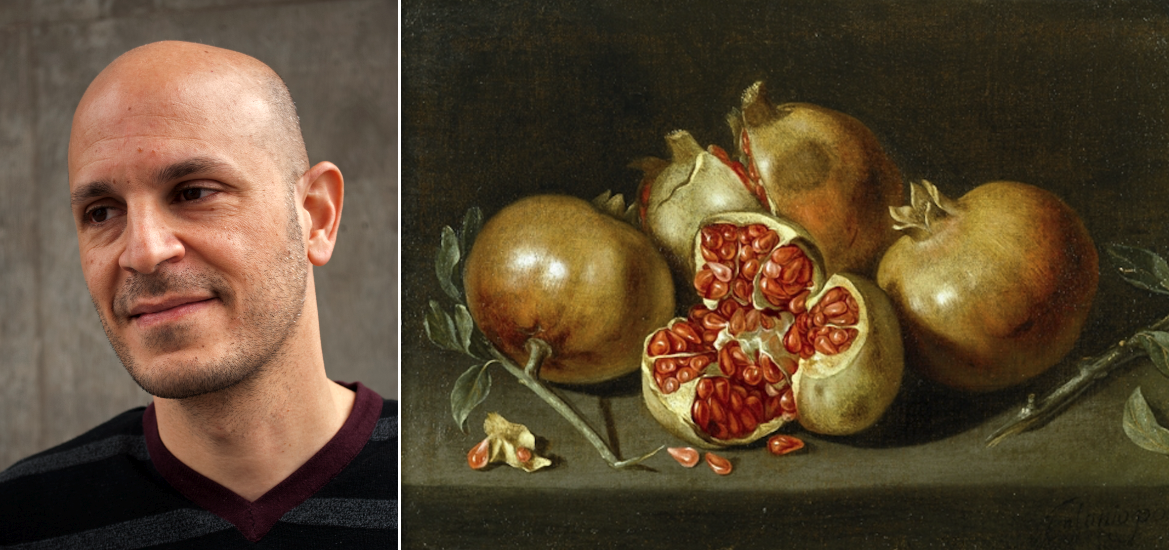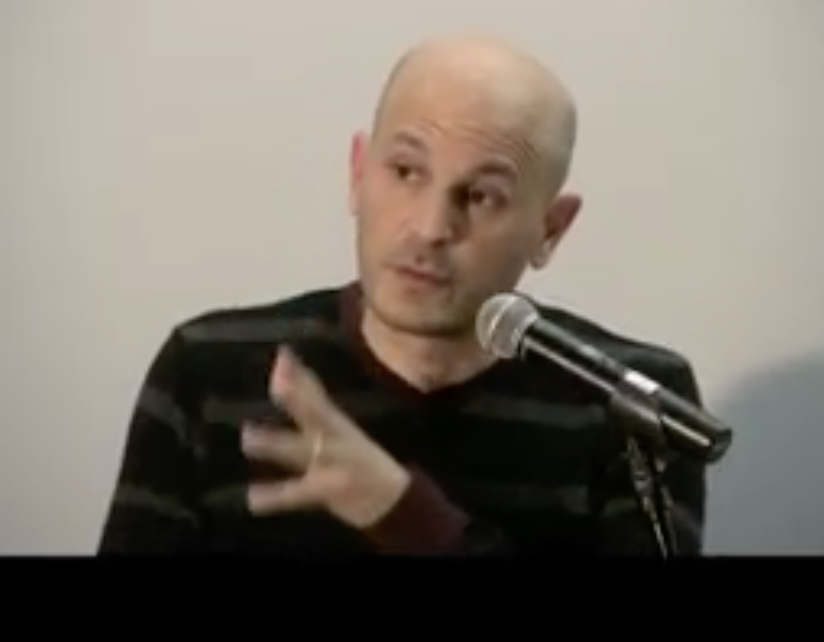
In the middle of a poetry reading at the University of Arizona’s Poetry Center in 2015, Palestinian-American poet Fady Joudah pauses. He starts to read his recent poem, “Still Life,” and then interrupts himself, looks up to the audience, and says: “For those of you who don’t know. I am a Palestinian-American.”
Having affirmed his identity, Joudah adds, with a trace of the self-deprecating smile on his face that grows larger as he speaks, “And for those of you who don’t care.”
What is the meaning of that aside? Is it sarcastic, as if to say that those who don’t care also about his Palestinian-American identity also don’t care about Palestinians? Or is sympathetic, as if to say that the poet’s identity is not important after all, and it is the poem that matters, that poetry should speak for itself? That the poet should shut up and let the poem speak?

Listen to the poem
Considering the weightiness of these questions and their diametrically opposed conclusions, it is remarkable that there is nothing in Joudah’s intonation or facial expression — let alone in his words — to tell us what he really means. We are not given tools to determine which interpretation is “right” and which is “wrong.” We are instead left suspended in a sea of indeterminacy.
You can listen to Joudah introduce his poem here. Whatever your take on his words, I think you will agree that the poet at this juncture is fundamentally ambiguous.
Such ambiguity captures a distinctive feature of Joudah’s poetics. Consistently and sometimes frustratingly, his work resists straightforward interpretation. Joudah’s poems court indirection; they prefer to speak indirectly through juxtapositions of sometimes startling images. In Louise Glück’s preface to Joudah’s debut collection, The Earth in the Attic (2008), which this Nobel-prize winning poet selected for the Yale Younger Poets Prize, Glück describes Joudah as “a deeply political artist” as well as “a luminous aesthete who thinks in nuance, in refinements.”
While the semiotics of Joudah’s poetics is necessarily opaque, his politics is as lucid as it is insistent. Whether the point of the introductory aside in his reading from 2015 was to deprecate the poet or to insist on the Palestinian dimension to his hyphenated identity, the poem itself is all about Palestine and Palestinians’ long history of displacement. I include the full text of “Still Life” at the end. What follows here is my attempt to come to terms with its poetics and its politics.
How to read an ambiguous poem
First published in his second collection Alight (2024), “Still Life,” tells the story of the Nakba — the foundational moment of Palestinian dispossession — from 1948 to the present, across generations. The poem is not linear. As if the poet were attempting to recreate the fragmentation of Palestinian experience in his poem, sentences break in the middle and are left as fragments. Thoughts do not complete themselves. Sequences of images are given out of chronological order. We move rapidly between the planetary and the minuscule, unsure where to anchor our consciousness as readers.
Like most great poems, “Still Life” repays multiple readings. Yet, to a greater extent than most poems, even after multiple readings, the poem resists interpretation. I attempt here to construct a narrative for the poem that clarifies its relationship to Palestinian experience. But I am acutely aware that with a poem such as this one, that prodigiously generates a dizzying range of interpretations, the subjective analysis of one individual cannot capture every nuance of the poem or document every layer at which it operates.
Pomegranates at home and in the world
Although it spans the world, the poem’s center of gravity is a family gathering, somewhere in a serene part of the United States, near forests, and with a resplendent garden.
The first image from this family scene does not occur until the middle of the poem, yet it marks a kind of beginning, because this is the scene around which the entirety of the poem is centered:
My father’s hands depearl
The fruit in a few minutes add a drop
Of rose water some shredded coconut
For us to gather around him
The centrality of this stanza is reinforced by the poem’s title, “Still Life,” which evokes a long history of mostly European painting that attempts to freeze a moment in time, to capture its life in static form, through the depiction of inanimate objects. Although the genre’s name refers to “life,” humans rarely appear in these paintings. Usually there is a combination of human-created objects (wine glasses and dishes, for example) and formerly living plant life, such as fruit and vegetables. For ambitious Baroque painters like Antonio Ponce (whose painting is captured above), excelling in the genre painting pomegranates.
Only at this point, mid-way through the poem, are we confronted with a static image that can become a source of stable meaning for the rest of the poem. The images that preceded this family scene, of divers searching for pearls (seeking the earth’s womb, in Joudah’s resonant image), a land at war (“tremor and shelling”), and a woman who abandons her lover for a better life (mysteriously and inexplicably, she marries an Israeli), have been disjointed and sometimes terrifying.
The pomegranate fruit is not named in this stanza, but we know what kind of fruit is implied from what is compared to it. A few stanzas earlier, in the poem’s first startling image, the poet has compared the earth “Where children don’t sleep / In resting tremor and shelling” to a pomegranate. Glück’s comment on another poem of Joudah’s, “Atlas,” applies to “Still Life” as well:
the sky and earth here are the sky and earth of an imperiled country, or the haunted landscapes of a lost homeland. In either case, the present is experienced elegiacally, the atmosphere of legend already permeating it.
Earth and sky are haunted in “Still Life” as well. Yet they are also integral to the poet’s political present.
We might expect the scarlet beauty of the pomegranate to have a soothing effect on the poem. Yet we should not forget that pomegranates are associated with death and mortality in many cultures. Although the Quran simply refers to a forbidden fruit when narrating the story of Adam and Eve (Hawwa), later Muslim traditions indicate that it is a pomegranate that tempts Eve. In ancient Greek mythology, Persephone is tricked by Hades into eating pomegranate seeds and it is this act that binds her to the Underworld, the world where the dead live. Most obviously, pomegranates are the color of blood.
The pomegranate in “Still Life” is not evil, but it is ambiguous and sometimes terrifying. Earlier in the poem, when we are still with children who cannot sleep at night and who are caught between “tremor and shelling,” the pomegranate that is the earth becomes
A helmet ochre or copper sinks
In buoyant salt water
Despite its ambiguity — or precisely because of it — the pomegranate is a symbol of beauty and of home as much as it is of terror in this poem. After evoking the horrors of war, the poet tells us that
Divers seek its womb despite its dura mater
And it hangs on trees like pregnant mistletoes
The poet then enters as a character in this fiction of “pregnant mistletoes” with pomegranates nestled inside the leaves. He reimagines the trajectory of his own life, and of his wife’s parents from the generation of the Nakba. While his own father “depearls” a pomegranate, the poet recalls how his wife’s father was “born driven out” on the “nose of Mount Carmel.”
Mount Carmel is a mountain range (not actually a single mountain, despite the name) in historic Palestine that means “the garden” or “gardenland.” For Palestinians who lived in these regions before they were forcibly displaced and scattered around the earth, Mount Carmel symbolizes their displacement.
The poet’s father shares the same fate as that of his wife’s father. Both Palestinian, their fates are united at the family gathering that is the structural and semantic center of the poem. The poet’s children watch their grandfather prepare a pomegranate for them to feast on. Skilled in the art of preparing pomegranates, he sprinkles the fruit with rosewater and shredded coconut, food that evokes his native land, Palestine, from which he has been displaced.
The grandfather loves to tell stories to his grandchildren. Through them, he will keep alive the memory of his beloved Palestine. The children are indeed transported by the end of the poem back to Palestine, a land which they may never have visited but which they know through their grandfather’s stories.
The final stanza concludes:
And they will listen to his first fire
On a cold night in a forest of eucalyptus trees
The British had planted as natural reserve
Outside Gaza
Joudah shows us that, amid all the atrocities
Palestinians have endured, Palestine lives.
This poem was published in 2015, eight years before the ongoing events in Gaza that Amnesty International, along with many other human rights organizations, has deemed a genocide. Yet even in this poem, Palestine is not a safe place. It is a land of trauma. At the same time, Palestine is a land of resplendent beauty, and a locus of meaning where pomegranates grow in abundance.
Joudah shows us that, amid all the atrocities Palestinians have endured, Palestine lives. His poem calls to mind the words of Mahmoud Darwish, which Palestinians often quote to me: “We love life if we find a way to it.”
Palestine lives across generations.
Palestine lives in the hands of a grandfather who knows how to seed a pomegranate, and in the imaginations of his grandchildren, born in America yet shaped by their Palestinian ancestors, who “refuse to believe the fire dies.”
Still Life
You write your name on unstained glass
So you’re either broken or seen through
When it came time for the affidavit
The panel asked how much art
Over the blood of strangers the word
Mentioned the weather and the sleepers
Under the weather all this
Was preceded by tension enzymatic
To the hills behind us and the forests ahead
Where children don’t sleep
In resting tremor and shelling
The earth is a pomegranate
A helmet ochre or copper sinks
In buoyant salt water
Divers seek its womb despite its dura mater
And it hangs on trees like pregnant mistletoes
I’ll stand next to one
And have my German lover
Remember me on a Mediterranean island
Though she would eventually wed
An Israeli once she ’d realized
What she wanted from life
A mother of two
On the nose of Mount Carmel
Where my wife’s father was born driven out
My father’s hands depearl
The fruit in a few minutes add a drop
Of rose water some shredded coconut
For us to gather around him
He will lead his grandchildren out transfer
Bundles of pine branches in the yard to where His tomatoes and cucumbers grow in summer
Let them let them
Gather the dried pine needles forever he says
They will refuse to believe the fire dies
And they will listen to his first fire
On a cold night in a forest of eucalyptus trees
The British had planted as natural reserve
Outside Gaza
___________
Rebecca Ruth Gould is the author of Erasing Palestine (2023), The Persian Prison Poem (2021), and Writers and Rebels (2016) Currently, she is Distinguished Professor of Comparative Poetics and Global Politics, School of Oriental and African Studies (SOAS), University of London.
"Still Life" from Alight. Copyright © 2013 by Fady Joudah. Used with the permission of The Permissions Company, LLC on behalf of Copper Canyon Press, coppercanyonpress.org.

